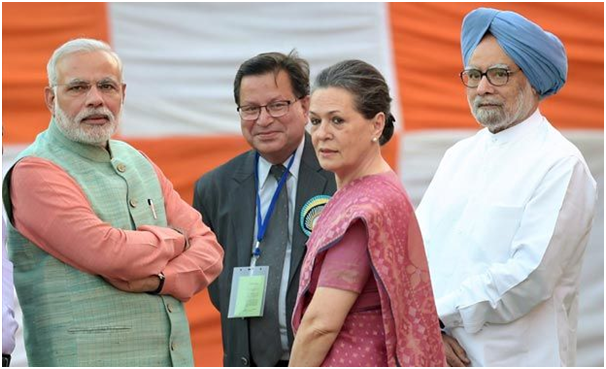Is PM Modi Doing What He Accuses Congress Prez Sonia Gandhi of Doing?
PM Modi with Congress President Sonia Gandhi

NEW DELHI: Without being a Dynasty, and in fact lambasting family rule very aggressively Prime Minister Narendra Modi is actually doing exactly what he accuses Congress President Sonia Gandhi doing. And in the process has lost successive elections, threatening to reduce the Bharatiya Janata Party to a fraction of its own.
The Congress party had an excuse, as it had unabashedly installed and followed the Nehru-Gandhi family at the helm since Independence, with a few years of exception. The BJP always projected itself as a party of equals, not bound by any family or any one individual but since the new government came to power it has moved out of the realm of inner party democracy---that was visible during the Atal Bihari Vajpayee Prime Ministership---into a one man rule. This extends at the most to a two man control with PM Modi and BJP President Amit Shah calling political shots, or PM Modi and Finance Minister Arun Jaitley when it comes to issues concerning the government.
In the process everyone else has been sidelined. The Ministers in government are at best ‘caretakers’ with all important decisions being referred to, and taken by the Prime Ministers Office. The files, sources say, are piling up there as the PMO is overburdened and slow in clearing proposals. All Ministers have been gagged, and no one except Jaitley, is authorised to speak without clearance. They cannot select their own Secretaries in the Ministries, with even appointment of personal staff being subjected to PMO scrutiny. Policy decisions are not shared any longer with the media by ‘informed sources’ with only announcements carefully tutored by the PMO made from time to time about ministerial proposals. As a result some of the BJP’s vocal assets who are now Ministers in government have been silenced.
The real impact of this autocratic functioning, however, has been felt by the BJP. Shah who has managed to at least get out of the wrong side of the Rashtriya Swayamsevak Sangh seems to have been working in tandem with it for the Bihar polls. RSS chief Mohan Bhagwat has been cooperative, flooding the state with RSS cadres with Shah, PM Modi part of a close knit strategy to win over the Bihar voters by communalising the situation. Towards the end PM Modi came out openly in his campaign speeches, warning the Dalits and backwards against what the “conspiracy” of the grand alliance to take away their reservation quota and hand it over to a religious community. He repeated this more than once, making it clear this statement was part of a calibrated approach by the party.
In the process, the BJP itself has been splintered as Shah is now determining who he can or cannot work with. As in the Lok Sabha elections where the senior leaders in respective states were sidelined, so also now in the state polls where those with an independent point of view and a tendency to voice their views, have been completely marginalised. The anger and resentment in Bihar within the BJP is palpable, with the numerous factions within having prevented PM Modi and Shah from naming a possible Chief Minister. This created more resentment with a supporter of BJP’s Bihar leader Sushil Modi earlier maintaining that the party’s refusal to repose trust in the latter will cost it dear. In Uttar Pradesh also new leaders are being encouraged over the old guard including veterans like Lalji Tandon, Kalraj Mishra and others. Mishra has been brought to the centre but according to Lucknow sources he is not at all happy about being moved away from state politics.
The “Shah effect” is what many in the BJP now say was responsible for the party’s slump in the Bihar polls. As a Bihar leader told The Citizen, “he has no idea about Bihar, he could not understand the people or the politics.” Shah is credited within the party of a ‘muscleman approach” where intimidation and browbeating, as the same leader said, passing for policy. So after the first two rounds when it became clear that the BJP had not done too well, instead of analysing the reasons, the strategy turned into a in-your-face approach with the Prime Ministers campaign being made more aggressive and hard than before. Interestingly many voters during the initial stages of the elections in Bihar had criticised the language used by the Prime Minister to The Citizen reporters there. “Yeh bhasha unko shobha nahin deti hai” was the refrain that made it very clear that the Bihar voters at least preferred the use of more temperate language by the Prime Minister of India.
The BJP did not read the signals right, as Shah is averse to diverse opinion and party insiders maintain that he only wants to hear what is pleasing to his ears. Hence, the criticism of the PM for not opening the promised accounts, for not being a man of his word, for trying to shake communal harmony in the state, for humiliating the Bihari by first questioning his Chief Ministers DNA and then attacking it for ‘jungle raj’ were all real issues that fed into the grand alliance campaign of the ‘insider’ and the ‘outsider.’ But Shah did not pick up any of this, as according to his own partymen, his ears are not trained to sensitivities. So instead of moving the campaign into a lower, and more temperate level, the decision to increase the pitch and the aggression further alienated the local voters.
As a UP BJP leader said, “if they want to save the party it can only be done by bringing everyone, including Advaniji with all his experience into decision making. It cannot be done by a two man team.”



